Cattle, sheep and other animals suffer and die during export from Australia to overseas countries for slaughter. Here we provide the official statistics of that ‘mortality’ during the sea voyages to (primarily) South East Asia for cattle, and the Middle East countries for sheep and cattle, over the past several decades. Their deaths must not be forgotten.
The long haul journeys to the Middle East particularly cause stress, injuries, illnesses and disease, and tens of thousands of animals (mainly sheep) die each year. In addition to these ‘routine’ deaths there are inevitable ‘incidents’ when things go very wrong — those are documented here. Animals Australia’s investigators have also documented the suffering of these animals after arrival in importing countries.
Sheep Exports
Most deaths that occur at sea are because the sheep fail to eat the pellet diet (47%), which often also contributes to enteritis (a further 26.9%). Heat stress is another prevalent factor during the Middle East summer. Other sheep suffer respiratory illness or pinkeye (leading to blindness) and die from injuries. Most sheep are not treated for their illness and are found dead in their pens during daily inspections. More sheep die after arrival, particularly during the several weeks in feedlots prior to slaughter.
Historical figures: During the last 3 decades 1981 – 2010, over 2.6 million sheep have been recorded as mortalities on ships to the Middle East.
Sheep mortalities – 2000-2010
|
All Voyages |
2000 |
2001 |
2002 |
2003 |
|
Animals exported |
4,553,189 |
6,257,120 |
6,069,702 |
4,379,920 |
|
Mortalities |
61,000 |
78,749 |
75,530 |
43,404 |
|
Average mortality rate |
1.34% |
1.26% |
1.24% |
0.99% |
|
All Voyages |
2004 |
2005 |
2006 |
2007 |
|
Animals exported |
3,638,413 |
3,651,584 |
4,158,671 |
3,768,953 |
|
Mortalities |
28,005 |
35,534 |
37,348 |
37,409 |
|
Average mortality rate |
0.77% |
0.97% |
0.89% |
0.99% |
|
All Voyages |
2008 |
2009 |
2010 |
|
|
Animals exported |
4,584,756 |
3,578,182 |
3,001,976 |
|
|
Mortalities |
40,241 |
32,117 |
26,825 |
|
|
Average mortality rate |
0.88% |
0.90% |
0.89% |
Ref: http://www.daff.gov.au/animal-plant-health/welfare/export-trade/mortalities
Cattle Exports
Most cattle exported for slaughter go to SE Asian countries, primarily (59% in 2010) to Indonesia. Others go to the Middle East, including to Egypt, Israel and, in recent years, to Libya and Turkey. Deaths are low on the short voyages to SE Asia, but on the long haul voyages cattle die of pneumonia, injuries and heat stress. Cattle die on long haul voyages to the Middle East at around 5-6 times the rate as those on voyages to SE Asia. In addition to on-board deaths, cattle may continue to sicken and die in feedlots in importing countries when respiratory or other illnesses have occurred during the voyage (see more).
Cattle mortalities on ships
Historical figures: Mortality statistics for cattle are only available from 1995 (the trade was relatively small prior to that time). In the period from 1995 – 2010 a total of 20,164 cattle were reported dead on ships.
|
All Voyages |
2000 |
2001 |
2002 |
2003 |
|
Animals exported |
752,381 |
767,348 |
953,754 |
731,703 |
|
Mortalities |
1,435 |
1,425 |
2,219 |
705 |
|
Average Mortality Rate |
0.19% |
0.19% |
0.23% |
0.10% |
|
All Voyages |
2004 |
2005 |
2006 |
2007 |
|
Animals exported |
654,419 |
547,356 |
623,052 |
712,320 |
|
Mortalities |
774 |
769 |
1,088 |
747 |
|
Average Mortality Rate |
0.12% |
0.14% |
0.175% |
0.10% |
|
All Voyages |
2008 |
2009 |
2010 |
|
|
Animals exported |
983,653 |
939,722 |
848,265 |
|
|
Mortalities |
1,131 |
932 |
1,192 |
|
|
Average Mortality Rate |
0.11% |
0.10% |
0.14% |
Ref: http://www.daff.gov.au/animal-plant-health/welfare/export-trade/mortalities
We can count the dead, but no-one can measure the suffering of those animals who endure such long trips only to be brutally handled and slaughtered without pre-stunning in importing countries.







